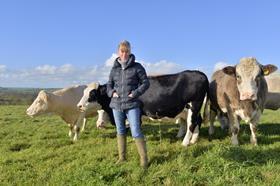
The government needs a clear plan and vision for British farming and food production, or risks wasting the huge potential of the country’s agriculture sector and potentially sleepwalking into more crises, the NFU has warned.
In her keynote speech to its annual conference, NFU president Minette Batters launched a new report,‘British farming: a blueprint for the future’ to highlight five key areas the government, supply chain and farmers needs to prioritise. These include:
- Commitment and investment from both government and retail to sell more British food at home and abroad;
- Using the powers in the Agriculture Act to enable farmers and growers to trade fairly;
- A new economic model that drives investment back into the land, ensuring the tenanted sector is not disadvantaged;
- A dial-up, dial-down immigration policy;
- Future farm policy with a properly funded Sustainable Farming Incentive.
Batters also called for certainty, commitment and consistency in government policy that can capitalise on British farming’s high standards of food production and net-zero ambition. She will say a plan with this approach will help avert unnecessary crises, such as the current disaster facing the pig sector.
“I want to be clear from the outset. British farming has a lot to be positive about, to be proud of, and to believe in; our high standards of food production, our net-zero ambitions, our education programme which reached a third of a million children last year,' Batters said.
“But government does need to understand that we need certainty, commitment and consistency. We need a plan that pre-empts crises, rather than repeatedly runs into them.
“This country needs a strategy and a clear vision for what we expect from British farming. We have completely contradictory government policies. It is raising the bar for environmental standards at home but pursuing trade deals which support lower standards overseas.
“It is claiming to value domestic food production but making it difficult to find workers to harvest or process it. It is stating there are many export opportunities for British food but failing to prioritise the resources to open up those new markets.
“If government wants to achieve more for the environment, then there is only one solution. We need policies and investment into the new world optimisation of agriculture. Polarised debates are getting us nowhere and they’re not allowing us to focus on the very real challenges around food supply in the future.
“Above and beyond everything, we need to all be working to the same objectives and aiming for the same outcome. There needs to be a plan. A plan which enables Britain to keep on farming and to continue to be world leaders in high quality, safe and sustainable food.”



